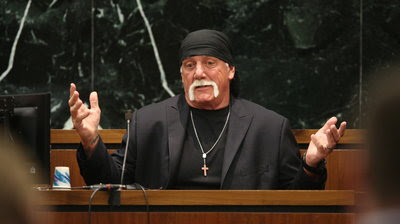
Hulk Hogan, whose real name is Terry Bollea, testifies in court on Tuesday during his trial against Gawker Media, in St Petersburg, Fla
Former professional wrestler Hulk Hogan testified in his invasion of privacy suit in St. Petersburg, Fla., against the media organization Gawker, which published a portion of a sex tape.
The case raises major questions about freedom of expression, privacy and celebrity. That being said — "it really couldn't be seedier in terms of the topic that provoked this suit," as NPR's David Folkenflik told Here and Now.
The news and gossip site published a portion of a tape showing Hulk Hogan (whose legal name is Terry Bollea) having sex with the wife of a former friend. That's accompanied by a 1,400-word graphic description of the extended encounter. Bollea maintains he was unaware that they were being taped, and Gawker says an anonymous source mailed it to the organization.
Bollea is seeking $100 million in damages from Gawker.
The issue of whether this video is "newsworthy" was in focus in court today. Gawker argues that Bollea's "frequent public discussion of his sex life made the clip newsworthy and thus protected by the First Amendment."
That's a point Bollea rejected under cross-examination from Gawker's lawyer Michael Sullivan, The New York Times reports:
Making the distinction between the character of Hogan and the person of Terry Bollea, he says he was playing Hogan in interviews where he discussed personal and intimate details of his sex life, his anatomy and his family.
"I'm kind of concerned about Hulk Hogan's privacy, but you kind of give it away," Bollea testified, according to the Times. "But in the privacy of your own home, no one invades my privacy."
Additionally, Bollea says he didn't have a problem with "news outlets discussing or even writing about the sex tape," The Associated Press reports. "It was only when Gawker broadcast an edited clip of the actual video that he said he began to suffer."
Gawker also rests its First Amendment argument on the claim that the videorepresents events truthfully:
Conversely, Bollea's lawyers "cautioned that the privacy of many Americans could be compromised" as a result of the case, the Times reports.
Other recent cases have grappled with the issue of newsworthiness versus privacy.
David breaks down why a case about a sex tape could have significant implications for other kinds of news:


No comments:
Post a Comment